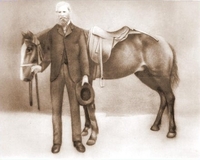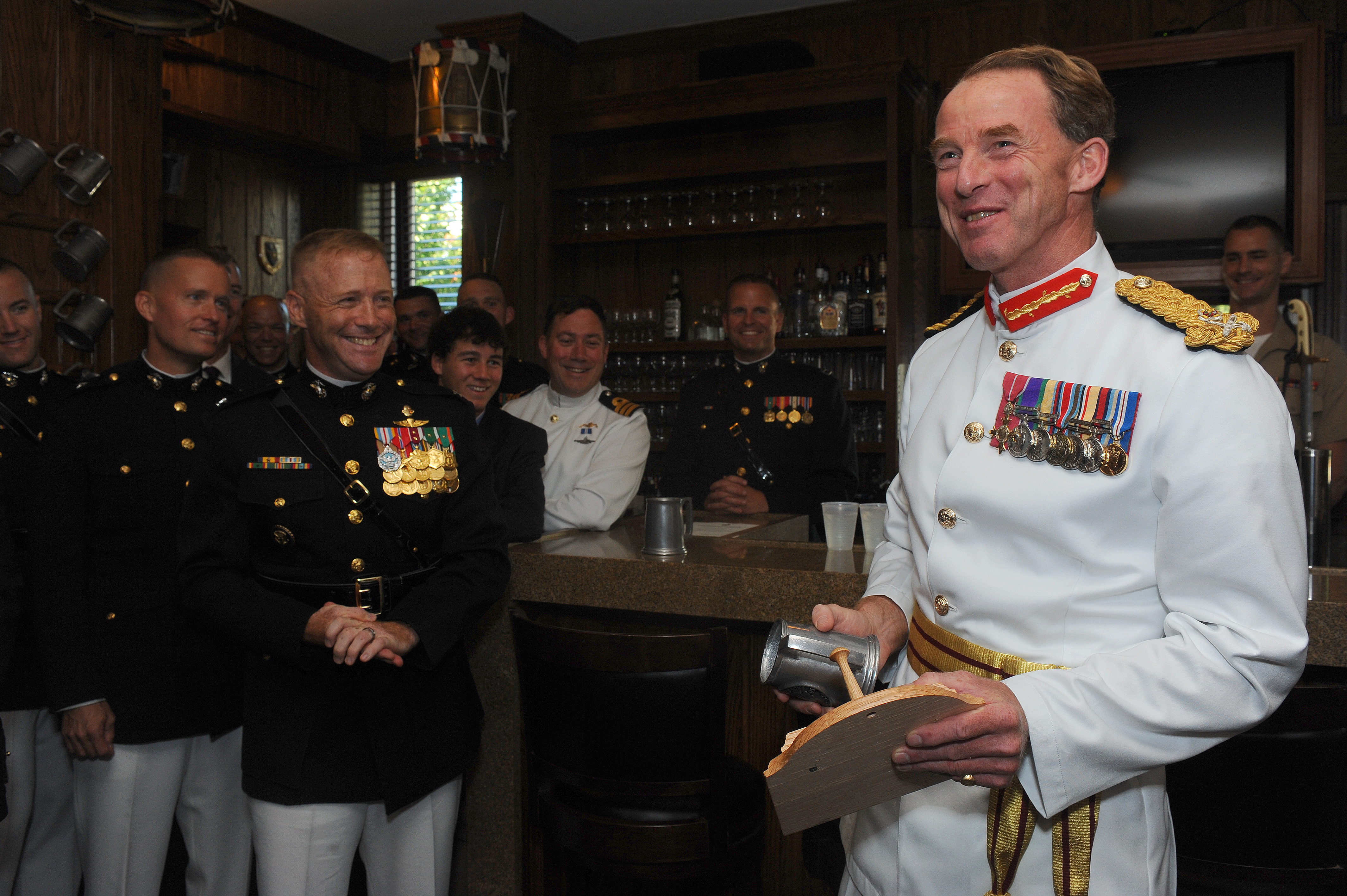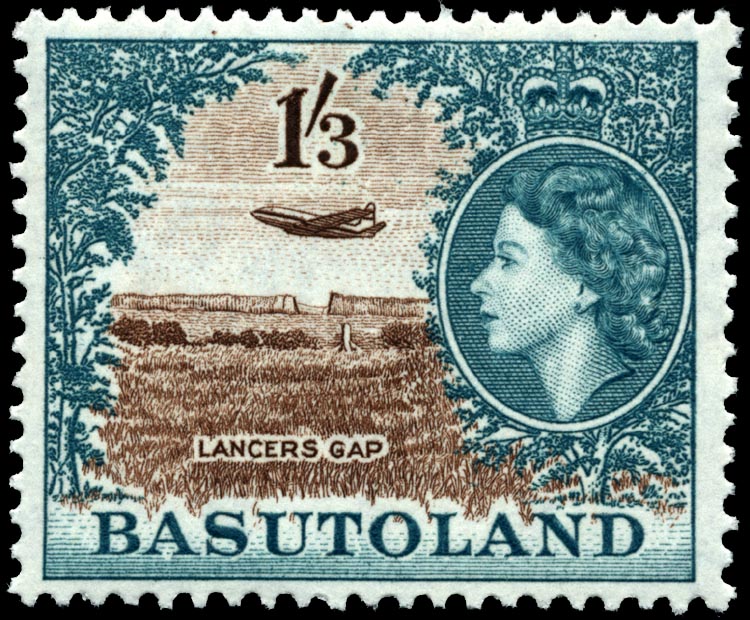|
Johan Fick
General Johan Isak Jacobus Fick was the founder of Ficksburg, a town in the Free State province, South Africa. After the Basotho Wars, peace was made and the town named after Johan Fick. He was also known as Commandant Generaal Johan Fick. He was born on September 22, 1816, on the farm Kruisfontein, in Olifantshoek in the Grahamstown district of South Afrika. He died on May 20, 1892, at the age of 75. He was buried in the town of Ficksburg. He was the son of Paul Hendrik Fick and Lenie Meyer. He was the second eldest of four sons his parents had, with the eldest Johan inheriting the family farm. The Great Trek His father Johan took part in the battle of the Battle of Grahamstown in 1819 to help the British defend Grahamstown against the Xhosa attack. During these years, the Xhosa's continued to raid the Boers farms. In total, 40 farmers (Boers) were killed and 416 farmhouses burnt down. In addition, 5,700 horses, 115,000 head of cattle, and 162,000 sheep were plundered by Xhosa t ... [...More Info...] [...Related Items...] OR: [Wikipedia] [Google] [Baidu] |
General Johan Isak Jacobus Fick
A general officer is an officer of high rank in the armies, and in some nations' air forces, space forces, and marines or naval infantry. In some usages the term "general officer" refers to a rank above colonel."general, adj. and n.". OED Online. March 2021. Oxford University Press. https://www.oed.com/view/Entry/77489?rskey=dCKrg4&result=1 (accessed May 11, 2021) The term ''general'' is used in two ways: as the generic title for all grades of general officer and as a specific rank. It originates in the 16th century, as a shortening of ''captain general'', which rank was taken from Middle French ''capitaine général''. The adjective ''general'' had been affixed to officer designations since the late medieval period to indicate relative superiority or an extended jurisdiction. Today, the title of ''general'' is known in some countries as a four-star rank. However, different countries use different systems of stars or other insignia for senior ranks. It has a NATO rank scal ... [...More Info...] [...Related Items...] OR: [Wikipedia] [Google] [Baidu] |
Moshoeshoe I
Moshoeshoe I () ( – 11 March 1870) was the first king of Lesotho. He was the first son of Mokhachane, a minor chief of the Bamokoteli lineage, a branch of the Koena (crocodile) clan. In his youth, he helped his father gain power over some other smaller clans. At the age of 34 Moshoeshoe formed his own clan and became a chief. He and his followers settled at the Butha-Buthe Mountain. He became the first King of Lesotho in 1822. Early life Moshoeshoe was born under the name Lepoqo in the village of Menkhoaneng in the north of modern day Lesotho. The precise year of his birth remains unknown, estimates range from 1780 to 1794; 1786 being the most commonly agreed upon date. His name's literal translation is Dispute, originated from accusations of witchcraft which were levied on a man in Mekhoaneng around the time of his birth. He was the first son of Mokhachane, a minor chief of the Bamokoteli sub-clan of the Basotho people and his first wife Kholu. Kholu was the daughte ... [...More Info...] [...Related Items...] OR: [Wikipedia] [Google] [Baidu] |
Afrikaner People
Afrikaners () are a South African ethnic group descended from Free Burghers, predominantly Dutch settlers first arriving at the Cape of Good Hope in the 17th and 18th centuries.Entry: Cape Colony. ''Encyclopædia Britannica Volume 4 Part 2: Brain to Casting''. Encyclopædia Britannica, Inc. 1933. James Louis Garvin, editor. They traditionally dominated South Africa's politics and commercial agricultural sector prior to 1994. Afrikaans, South Africa's third most widely spoken home language, evolved as the First language, mother tongue of Afrikaners and most Cape Coloureds. It originated from the Dutch language, Dutch vernacular of South Holland, incorporating words brought from the Dutch East Indies (now Indonesia) and Madagascar by slaves. Afrikaners make up approximately 5.2% of the total South African population, based upon the number of White South Africans who speak Afrikaans as a first language in the South African National Census of 2011. The arrival of Portugal, Portug ... [...More Info...] [...Related Items...] OR: [Wikipedia] [Google] [Baidu] |
Paul Kruger
Stephanus Johannes Paulus Kruger (; 10 October 1825 – 14 July 1904) was a South African politician. He was one of the dominant political and military figures in 19th-century South Africa, and President of the South African Republic (or Transvaal) from 1883 to 1900. Nicknamed ''Oom Paul'' ("Uncle Paul"), he came to international prominence as the face of the Boer cause—that of the Transvaal and its neighbour the Orange Free State—against Britain during the Second Boer War of 1899–1902. He has been called a personification of Afrikanerdom, and remains a controversial figure; admirers venerate him as a tragic folk hero. Born near the eastern edge of the Cape Colony, Kruger took part in the Great Trek as a child during the late 1830s. He had almost no education apart from the Bible. A protégé of the Voortrekker leader Andries Pretorius, he witnessed the signing of the Sand River Convention with Britain in 1852 and over the next decade played a prominent role in the ... [...More Info...] [...Related Items...] OR: [Wikipedia] [Google] [Baidu] |
Louw Wepener
Lourens Jacobus (Louw) Wepener was born on 21 July 1812. He was the son of a German people, German immigrant – Frederick Jacobus Wepener – and a Cape Colony woman – Johanna Maria Erasmus. Wepener was born in Graaf-Reinet and lived with his uncle – Lourens. He was christened by Reverend Andrew Murray of the Dutch Reformed Church. Wepener was first married to Hester Susanna Nel and then later to Hilletje Maria Levina Van Aardt. He had nine children with his second wife. Military career Wepener participated in some Frontier Wars (1834–1853) as Acting Field Cornet. He moved to the farm De Nek in Aliwal North in 1850 where he took part in the Eighth Frontier War (1850–1853) (Xhosa wars) and was promoted to Commandant due to his outstanding leadership. He later migrated to the Orange Free State where he bought two farms in Bethulie district – Constantia and Moordernaarspoort. When he arrived in Orange Free State, Wepener was appointed Acting Commandant. He took part in the ... [...More Info...] [...Related Items...] OR: [Wikipedia] [Google] [Baidu] |
Commandant-general
Commandant-general is a military rank in several countries and is generally equivalent to that of major-general. Argentina Commandant general is the highest rank in the Argentine National Gendarmerie, and is held by the national director of the gendarmerie and his senior deputies. Depending on the appointment, it may be equal to any Argentine army rank from brigade general to the highest Argentine army rank, lieutenant general. Ireland During the Irish Civil War of 1922–23, the Irregulars, or anti-Treaty IRA, applied this term to the leaders of their various brigades throughout the country. The term was acquired from the Boer ranks, through veterans of the Irish Transvaal Brigade. Italy The ''comandante generale'' (commandant general) in Fascist Italy's Blackshirts was the title of their head and was held by Benito Mussolini from 1922 to 1943. The title is now held by the commander of the ''Carabinieri''. Portugal and Brazil Historically, commandant-general ( pt, comandante-g ... [...More Info...] [...Related Items...] OR: [Wikipedia] [Google] [Baidu] |
Free State–Basotho Wars
The Free State–Basotho Wars refers to a series of wars fought between King Moshoeshoe I, the ruler of the Basotho kingdom, and the white settlers, in what is now known as the Free State. These can be divided into the Senekal's War of 1858, the Seqiti War in 1865−1866 and the Third Basotho War in 1867−68. These three wars were fought over the territorial rights in the area between the Caledon and Orange rivers; from present day Wepener to Zastron, and the area north of the Caledon River, which includes present day Harrismith and the area further westwards. The wars resulted in the white settlers acquiring large tracts of land from Basotho, and the Basotho eventually accepting annexation as a part of the British Empire. Background In 1818, King Moshoeshoe I, who was the son of Mokhachane, chief of the Ba-Mokoteli branch of the Koena (Crocodile) clan, helped to gain power over small clans who had been displaced during the Mfecane. Mfecane is a Zulu word and in the Sesot ... [...More Info...] [...Related Items...] OR: [Wikipedia] [Google] [Baidu] |
Philip Edmond Wodehouse
Sir Philip Edmond Wodehouse (27 February 1811 – 25 October 1887) was a British colonial administrator. Biography Wodehouse was the eldest child of Edmond Wodehouse and his wife and first cousin Lucy Wodehouse. His paternal grandfather Thomas Wodehouse and maternal grandfather Reverend Philip Wodehouse were both younger sons of Sir Armine Wodehouse, 5th Baronet, whose eldest son John Wodehouse, 1st Baron Wodehouse, was the ancestor of the Earls of Kimberley. Wodehouse entered the Ceylon Civil Service at an early age and later served as superintendent of British Honduras from 1851 to 1854. He then served as Governor of British Guiana from 1854 to 1861, where his unpopular measures (such as imposing a head tax) generated enormous riots that even saw him and his retinue attacked and pelted. In 1861 he was appointed Governor of the Cape Colony and British High Commissioner for Southern Africa, taking over from Sir George Grey who had been recalled for disobeying Imperial ord ... [...More Info...] [...Related Items...] OR: [Wikipedia] [Google] [Baidu] |
Johannes Brand
Sir Johannes Henricus Brand, (popularly known as Sir Jan Brand and sometimes as Sir John Henry Brand or Jan Henrick Brand; 6 December 1823 – 14 July 1888) was a South African lawyer and politician who served as the fourth state president of the Orange Free State, from 2 February 1864 until his death in 1888. He was the son of Sir Christoffel Joseph Brand (1797–1875), speaker of the Cape legislative assembly, and Catharina Fredrica Küchler. Johannes Brand married in 1851 to Johanna Sibella Zastron, a daughter of the Registrar of Deeds in Cape Town. The couple had 8 sons and 3 daughters. Life history Johannes Brand was born in Cape Town, and was educated at the South African College in that city. Continuing his studies at Leiden in the Netherlands, he took the degree of D.C.L. in 1845. He continued his law studies in Britain and was called to the English bar at the Inner Temple in 1849. After his return to South Africa, Brand settled in Cape Town, where he prac ... [...More Info...] [...Related Items...] OR: [Wikipedia] [Google] [Baidu] |
Lesotho
Lesotho ( ), officially the Kingdom of Lesotho, is a country landlocked country, landlocked as an Enclave and exclave, enclave in South Africa. It is situated in the Maloti Mountains and contains the Thabana Ntlenyana, highest mountains in Southern Africa. It has an area of over and has a population of about million. It was previously the British Crown colony of Basutoland, which declared independence from the United Kingdom on 4 October 1966. It is a fully sovereign state and is a member of the United Nations, the Commonwealth of Nations, the African Union, and the Southern African Development Community. The name ''Lesotho'' roughly translates to "land of the Sotho". History Basutoland Basutoland emerged as a single body politic, polity under King Moshoeshoe I in 1822. Moshoeshoe, a son of Mokhachane, a minor tribal chief, chief of the Bakoteli lineage, formed his own clan and became a chief around 1804. Between 1820 and 1823, he and his followers settled at the Buth ... [...More Info...] [...Related Items...] OR: [Wikipedia] [Google] [Baidu] |
Orange Free State
The Orange Free State ( nl, Oranje Vrijstaat; af, Oranje-Vrystaat;) was an independent Boer sovereign republic under British suzerainty in Southern Africa during the second half of the 19th century, which ceased to exist after it was defeated and surrendered to the British Empire at the end of the Second Boer War in 1902. It is one of the three historical precursors to the present-day Free State province. Extending between the Orange and Vaal rivers, its borders were determined by the United Kingdom of Great Britain and Ireland in 1848 when the region was proclaimed as the Orange River Sovereignty, with a British Resident based in Bloemfontein. Bloemfontein and the southern parts of the Sovereignty had previously been settled by Griqua and by '' Trekboere'' from the Cape Colony. The ''Voortrekker'' Republic of Natalia, founded in 1837, administered the northern part of the territory through a ''landdrost'' based at Winburg. This northern area was later in federation wi ... [...More Info...] [...Related Items...] OR: [Wikipedia] [Google] [Baidu] |
Battle Of Berea
The Battle of Berea was a battle between British forces under Sir George Cathcart and Basuto-Taung forces under King Moshoeshoe I that took place on 20 December 1852. The battle began when British forces broke into three columns and crossed the Caledon River, with the goal of seizing Basuto cattle as a form of punishment for past Basuto cattle raiding. A combination of stiff Basuto resistance, poor planning and miscoordination on the side of the British forces led to far fewer cattle being seized than originally planned. The British withdrew in order to regroup after suffering relatively high casualties. However a peace agreement was reached before the resumption of hostilities. The Basuto paid limited restitution, while agreeing to halt any further cattle raids against British subjects. Background Foundation of the Basuto State During the early 19th century, a diverse group of Sotho, Nguni and Tswana speaking tribes settled in the Caledon River region. The latter two formed the ... [...More Info...] [...Related Items...] OR: [Wikipedia] [Google] [Baidu] |








